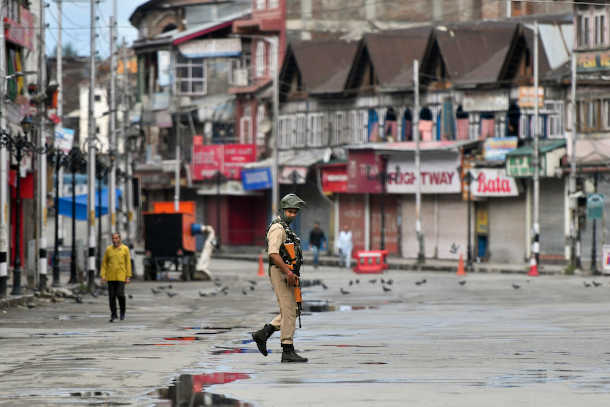
A soldier patrols a deserted road in the Lal Chowk area of Srinagar on Aug. 19. A massive security and communications lockdown was imposed on Aug. 5 following the decision to strip Jammu and Kashmir of its autonomy. (Photo by Punit Paranjpe/AFP)
For the past two weeks, Mehraj-ud-din Khan has known little about the well-being of his aged parents who have gone on the hajj, a pilgrimage Muslims make to the sacred cities of Mecca and Madina.
The 52-year-old, a resident of Srinagar, the capital of Jammu and Kashmir state, can hardly leave his two-story house because of a curfew in the Muslim-majority state since the Indian government took away its autonomy in a surprise move on Aug. 5.
“I have absolutely no idea where my parents are. Are they alive or have they been killed in a stampede? Where would I call? Where would I go?” asked Khan, whose parents are both over 80 years of age.
Some seven million people in the Kashmir Valley, a heavily Muslim area of the northern state, continue to live under virtual house arrest after the government imposed measures to block protests against its action.
The federal government, led by the pro-Hindu Bharatiya Janata Party (BJP), scrapped the provisions of the Indian constitution that accorded special status to Jammu and Kashmir. It also divided the state into two federally ruled territories.
The changes will allow people living in other parts of India to buy land and property in Kashmir, marry Kashmiri women and claim domicile in the state.
Muslim leaders say the changes are aimed at changing the Muslim character of the region. They also fear the government may help Hindus settle in the region to change its demography.
However, the government says the decision integrates the region with India and will pave the way for more federal grants. It will also help Indian companies to buy land and expand their business to help Kashmir’s economic growth.
Suspecting possible protests, the government deployed the army, sealed main roads and entry points, cut telecommunication lines including mobile phones and blocked the internet. Cable television operators were also asked to stop providing services.
Pre-emptive measures
Almost a week ahead of the Aug. 5 move, the government issued a general advisory to all tourists staying in Kashmir to move out of the state “as soon as possible.”
Hindus on the Amarnath Yatra, a pilgrimage to an icy mountain cave, were asked abruptly to cut short their journey and escorted out of the state.
The emergency moves, the Indian government said, were made against a backdrop of a possible attack from Pakistan, its neighboring Muslim-majority nation.
Troops were deployed in airports on high alert. Satellite phones were also distributed among police officers and the civil administration.
Omar Abdullah, the state’s former chief minister, had hinted at the peculiar situation a night before the clampdown.
“I believe that I am being placed under house arrest from midnight tonight and the process has already started for other mainstream leaders. No way of knowing if this is true but if it is then I will see all of you on the other side of whatever is in store. Allah save us,” Omar tweeted on Aug. 4.
‘Undemocratic and inhuman’
People such as Mehraj-ud-din Khan are angry over such “anarchic measures” by the government, terming them undemocratic and inhuman.
Abdul Rahid had to stand in a serpentine queue outside a police station for over three hours on Aug. 19 to call his daughter, who is studying engineering in the southern city of Bangalore. Only one phone was available for about 200 people wanting to call their children.
Mukhtar Ahmad, another resident of Srinagar, said the government has perpetrated the worst ever terror on the people of Kashmir.
“Where is the world and where are the champions of human rights? We are being caged with no communication facilities. We cannot even call an ambulance if we are sick and cannot call a fire tender if fire engulfs our houses,” he said.
“Friends and relatives cannot attend our last rites if we die these days. No one knows who is where. Where in the world has this happened before?”
K. Vijay Kumar, an adviser to the Jammu and Kashmir governor, told media in Srinagar on Aug. 18 that curbs imposed on people’s movement and communications have been taken to safeguard people’s lives and to act against “trouble mongers.”
He said restrictions are being eased based on the security situation and that communication channels will be restored in a phased manner, starting with landline phones.
Activists arrested
The curfew remained in place in Kashmir on Aug. 21, with people not allowed to move out of their houses. However, in some pockets where there is no threat of any protest, the government allows locals to move around for a while.
Schools, colleges, universities, business establishments and government offices remained closed.
Hundreds of activists and politicians, including former chief ministers Omar Abdullah and Mehbooba Mufti, have been arrested by the government and detained in jails.
A limited internet facility for journalists has been made available in a private hotel in Srinagar where they can email stories.


